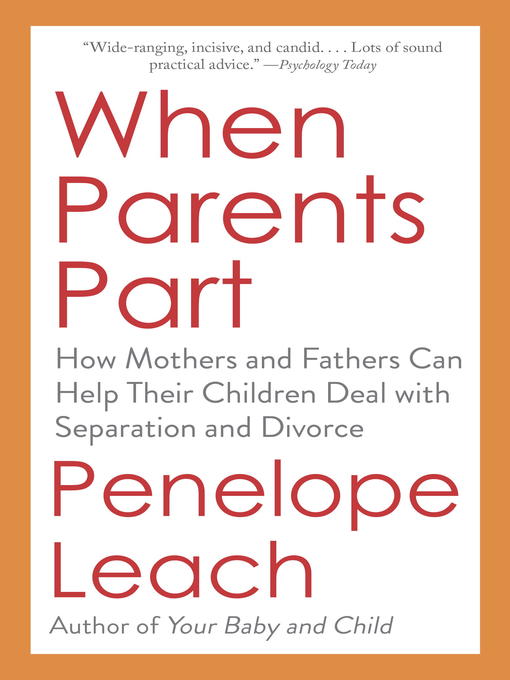
When Parents Part
How Mothers and Fathers Can Help Their Children Deal with Separation and Divorce
کتاب های مرتبط
- اطلاعات
- نقد و بررسی
- دیدگاه کاربران
نقد و بررسی

March 2, 2015
Research psychologist Leach delivers a sobering look at the effect divorce has on families, a problem she says is at “epidemic levels.” She persuasively demonstrates that it makes children particularly unhappy, but insists she is not suggesting staying married “for the sake of the children.” Leach encourages couples considering divorce to employ a “child-centeredness” approach and consider each child as an individual. Her advice addresses a wide array of topics, including dealing with new spouses or partners, custody during holidays, and what to do if one parent moves far away. Leach peppers the book with comments from children, parents, and grandparents that underscore the importance of fostering the right environment. Leach’s heavy emphasis on research data stumbles with her occasional use of statistics from disparate countries, an apparent effort to speak to the “English-speaking world” as a whole that American readers may find instead makes the book less specifically applicable to their concerns. Otherwise, the ample information offered here serves as a solid foundation for the steps Leach recommends for “making the most of a bad job.”

March 15, 2015
A guide to managing the fallout for children when parents choose to separate and divorce.British research psychologist Leach (The Essential First Year, 2010, etc.) has an impressive list of credentials in the child development sphere. In addition to countless other designations, she is a fellow of the British Psychological Society and president and chair of the Child Development Society, and she has been a member of the curriculum board of Sesame Street. Suffice to say that she has the wide range of experience that justifies the label of "expert," which makes this new book, on supporting children through parents' separation and divorce, an important read for anyone interested in how to successfully navigate that rocky situation. Early on, the author notes that, were divorce a physical disease, the level of occurrence in the United States would warrant emergency research into vaccines and immunizations. Leach thoughtfully structures the book, beginning with a breakdown of how children perceive, and are affected by, their parents' separation at various ages, from baby to young adult. This structure allows the parents to jump right in and begin finding answers. Other, less-immediate family members receive the same consideration, and Leach provides an overview of legal and practical considerations before turning to the second part of the book, "Separating Better-or Worse." The author makes sure to maintain a child-centered approach, and she explores how to reinforce that approach in the face of alienation, partner conflict, and the processes of making a parenting plan and putting it into action. She also explores post-divorce difficulties and the constantly changing dynamics between parents and their children. Leach strikes the right balance between a hard-nosed examination of the data and a compassionate, let's-make-this-work pragmatism. This will allow parents to shore up their children's stability when it may feel like everything else is crumbling down.

May 1, 2015
Best-selling parenting guru Leach (Child Care Today, 2009) wades into the fractious subject of divorce and parenthood and will likely gain more enemies than friends with some of her conclusions. From the first page, she relies on male pronouns to designate the parent who leaves and doesn't look back as she asserts repeatedly that when marriages break up, it is the mother who keeps the child, and that, in fact, mothers are always the primary caregiver, regardless of the father's presence. There are even swipes at grandfathers and their inability to bond as successfully as grandmothers. As if this is not problematic enough, the text is unwieldy and laden with references to studies from the U.S., UK, and Australia that break up the narrative. Leach fills sidebars with brief quotes from children of various ages but provides no context for them and even includes herself as an unnamed 11-year-old who was alienated by her father after her parents' divorce. There are valid points made here, to be sure, but many readers will be turned off, especially fathers.(Reprinted with permission of Booklist, copyright 2015, American Library Association.)

December 1, 2014
A real go-to expert in child development (Your Baby & Child has sold more than 1.25 million copies), Leach addresses the sorry truth that fewer than half of today's children will celebrate their 16th birthday with their parents still together. Her big concern: today's well-meant custodial arrangements can be detrimental, particularly for young children, undermining parental attachment and hence brain development.
Copyright 2014 Library Journal, LLC Used with permission.

Starred review from May 15, 2015
The esteemed Leach (Your Baby and Child; Children First) offers a kids-first approach to separation and divorce, giving parents solid advice on how this event is perceived and handled by children of all ages. Leach always takes a child-centric approach, which at times conflicts with common custody arrangements, likening the divorce rate to a physical disease that would attract government funding were it so high. Nonetheless, she helps parents understand how their parting affects children and how they can do best by their kids in the process. She addresses "ages and stages," dealing with other people and family members, and practical and legal advice before moving into specifics such as long-distance parenting, getting kids to take sides, and holidays. VERDICT Leach is a highly regarded child advocate; her research is complete, her advice priceless, and her style encouraging. An essential acquisition.
Copyright 2015 Library Journal, LLC Used with permission.

























دیدگاه کاربران